Hibiscus tea is known for its many health benefits and beautiful red color. It is consumed all over the world and has been traditionally used for treating high blood pressure.
You can use hibiscus flower petals and calyxes to make hot or cold tea or mix it with other herbs.
In this guide, I’ll tell you all about the amazing health benefits that hibiscus tea has. I also recommend that you check out my 3 delicious hibiscus tea recipes.
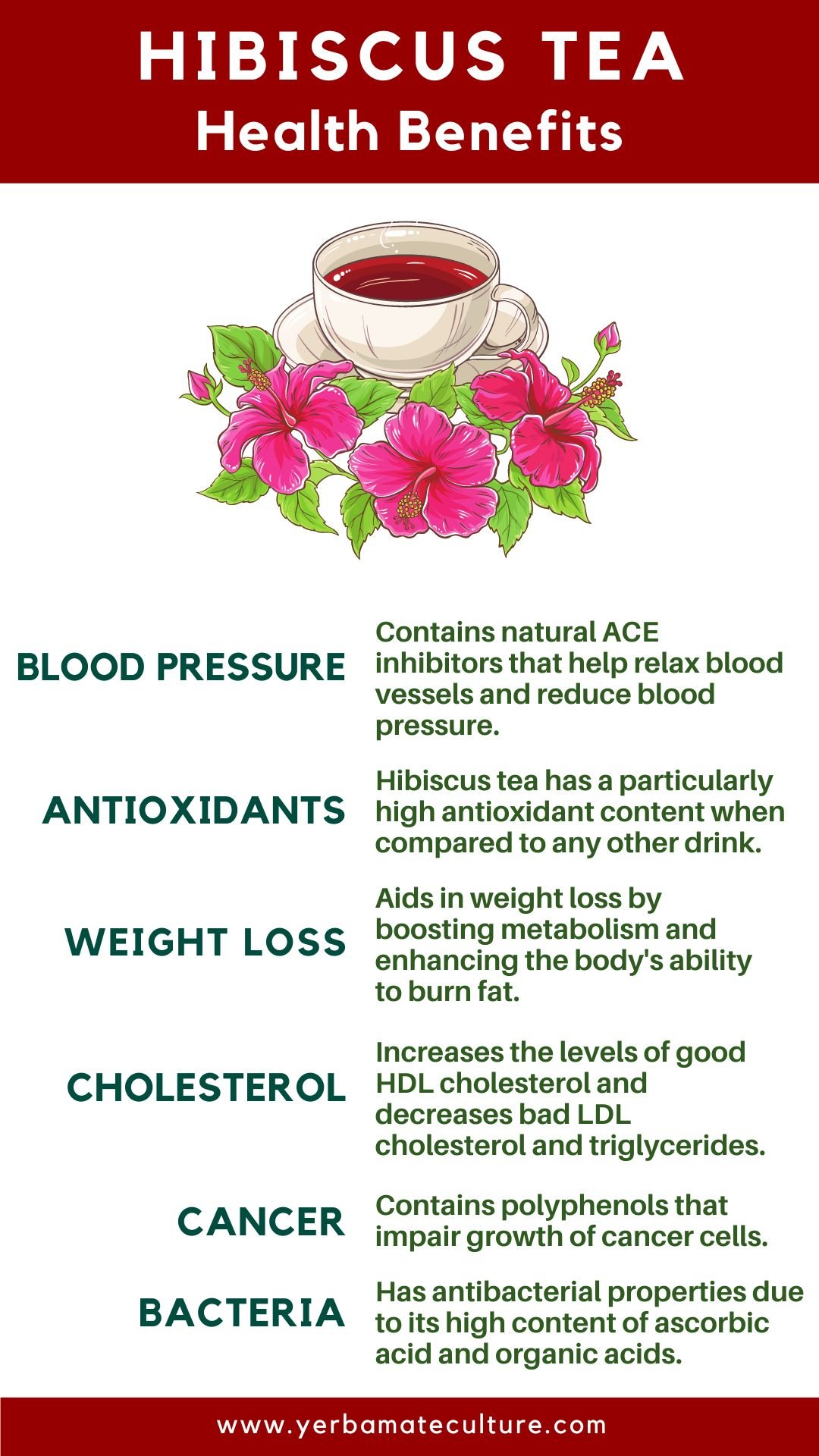
6 Amazing Hibiscus Tea Benefits
1. Prevents High Blood Pressure
High blood pressure (hypertension) is a common condition that can lead to heart disease over time.
One of the most well-known, and maybe the most important, health benefit of hibiscus is that it helps with lowering high blood pressure.
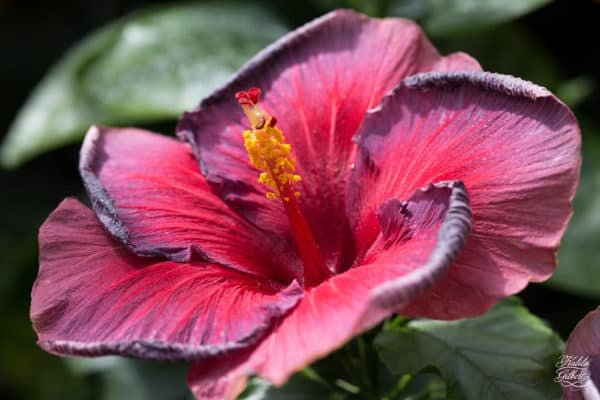
Research Results on Hibiscus and Blood Pressure
A study from 1999 had 31 patients with moderate essential hypertension consume hibiscus tea for 12 days. The study found that during this period both systolic and diastolic blood pressure was significantly lowered. In addition, three days after the treatment was stopped, the blood pressure values had increased almost back to the level they were before.
A 2010 study published in Phytomedicine compared the results of several trials that had examined the effectiveness and safety of hibiscus tea as a treatment for adults with high blood pressure. Four short-term trials with a total of 390 patients were analyzed. The study found that hibiscus was effective in reducing blood pressure.
Another study where 64 participants were given either hibiscus tea or placebo, had the subjects consume it for a 6-week period. The participants were mildly hypertensive adults between 30 to 70 years old. Again, a significant decrease in blood pressure was observed at the end of the test period.
Finally, a meta-analysis of 5 studies published in 2015 also found that hibiscus tea lowered both systolic and diastolic blood pressure significantly.
The effectiveness of hibiscus can be attributed to bioactive compounds that have been shown to act as natural ACE inhibitors, similar to some blood pressure medications. These compounds help relax blood vessels, which reduces blood pressure.
The research on hibiscus tea clearly indicates that it lowers blood pressure. Yet, more studies are needed to confirm its effectiveness as a primary treatment for hypertension.
What we can state as facts is that consuming hibiscus tea daily is an effective dietary component for lowering blood pressure.
2. Loaded with Antioxidants
Antioxidants are an effective way to reduce free radicals that attack our cells and cause oxidative stress. This results in aging and can eventually cause neurodegenerative conditions such as Parkinson’s disease.
The good news is, that hibiscus tea is loaded with antioxidants!
Research Results on Hibiscus and Antioxidants
When the antioxidant content of hibiscus tea was compared to 280 other beverages it ranked number one.
A study from 2011 tested the antioxidant and drug detoxification potential of hibiscus tea on rats. According to the study, hibiscus has a significant effect in reducing the harmful effects of free radicals, as it reduced the amount of free radicals by up to 92%.
3. Aids with Weight Loss
Hibiscus tea is one of the best herbal teas to help you with weight loss.
Drinking hibiscus tea daily can be an effective aid in losing weight and burning fat because it affects our metabolism. Hibiscus inhibits the production of amylase, an enzyme that catalyzes the hydrolysis of starch into sugars.
Thus, it lowers the absorption of starch and glucose which are often components leading to weight gain.
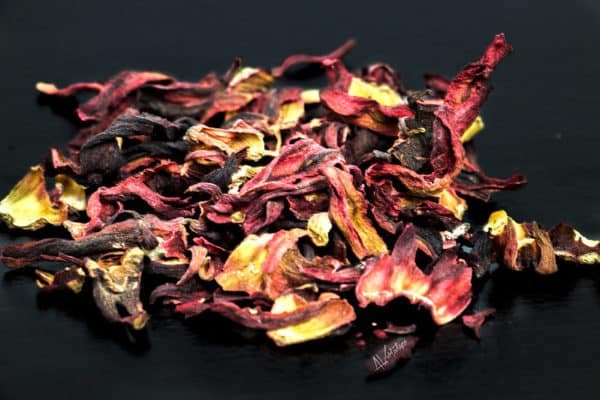
Research Results on Hibiscus and Weight Loss
In a placebo-controlled Taiwanese study, 36 obese participants took hibiscus extract for 12 weeks. The hibiscus extract helped the subjects lose weight, reduce body fat, and lower the waist-to-hip ratio.
A review study from 2019 gathered reports on human, animal, and cell models, related to the various anti-obesity effects of the bioactive compounds found in hibiscus. The study indicates that hibiscus can be effective in the treatment of obesity as it can help inhibit lipid accumulation and reduce body weight.
4. Helps with Lowering Cholesterol
Several studies indicate that hibiscus tea can also help with lowering bad cholesterol (LDL) and increasing good cholesterol (HDL).
Research Results on Hibiscus and Cholesterol
A review of several medical trials from 2014 concludes that in the majority of the trials, hibiscus tea helped with promoting better blood cholesterol levels.
However, there are also other studies that did not find significant benefits for cholesterol levels. More research is needed to confirm hibiscus’ positive effects on blood cholesterol.
5. Prevents Growth of Cancer Cells
Cancer has become more and more common over the years and is globally the second leading cause of death responsible for an estimated 9.6 million deaths in 2018. In wealthy countries, it is the leading cause of death.
Hibiscus contains a high concentration of polyphenols that have potential in cancer prevention.
Research Results on Hibiscus and Cancer Prevention
In test-tube studies, hibiscus has demonstrated an ability to impair the growth of cancer cells.
As the research was done only in test-tubes, human studies are needed to find out how effective hibiscus really is in cancer prevention.
6. Inhibits Bacteria
Hibiscus tea is also known for its anti-inflammatory and antibacterial properties. In addition, it contains vitamin C and can help with preventing flu and the common cold.
Research Results on Hibiscus and Bacteria
Test tube studies have shown that hibiscus can inhibit Escherichia coli bacteria which is a common cause of diarrhea and stomach cramping.
Again, more research is needed to confirm if hibiscus tea can be used to prevent stomach disease caused by bacterial infections.
Possible Side Effects and Risks Related to Hibiscus Tea
As discussed, drinking hibiscus tea daily has many health benefits.
But are there any side effects? Or some other risks?
In general, drinking hibiscus tea has been found to be safe.
However, if you take high doses of hibiscus extract there could be some risks such as liver damage.
If you are pregnant or breastfeeding, it’s better to avoid drinking hibiscus tea, or at least to consult your doctor before doing so. Hibiscus tea could also interact with certain medications such as chloroquine (malaria medication) and decrease its effectiveness.
Hibiscus Tea – Healthy and Delicious
Hibiscus tea is definitely one of the healthiest teas available. Traditionally it has been used as a herbal remedy for many illnesses and its benefits have now been proven by research.
In addition to the above-mentioned benefits, it may also help with protecting the liver from diseases, relieving menstrual pain, and improving digestion.
Here is a great video that sums up the benefits of hibiscus tea:
Hibiscus tea is popular in many cultures across the globe and there are many ways to make and enjoy it.
Iced hibiscus tea, called aqua de Jamaica, is a popular drink in Mexico and Central America. It’s also consumed in North Africa, parts of West and Central Africa, and is even known as the national drink of Senegal.
Read also: 6 Best Hibiscus Tea Brands Reviewed
Hibiscus Tea Benefits FAQ
What are the main health benefits of hibiscus tea?
Research shows that hibiscus tea can help with lowering blood pressure and losing weight. Other potential health benefits include the potential for lowering cholesterol, preventing cancer, and inhibiting harmful bacteria.
In addition, hibiscus tea has a high level of beneficial antioxidants that can protect your cells from oxidative stress and prevent age-related disorders such as Parkinson’s disease.
Is hibiscus tea good for weight loss?
Studies indicate that hibiscus tea can be an effective aid in losing weight. It can lower the absorption of starch and glucose, which may help with weight management and preventing the formation of new fat tissue.
Does hibiscus tea have any side effects?
Consuming hibiscus tea is generally considered safe. However, you should avoid consuming excessive amounts.
If you have low blood pressure or are pregnant or breastfeeding, you should avoid drinking hibiscus tea. Also, if you are on any medication, consult your doctor before consuming it.
If you have any questions or comments related to the health benefits of hibiscus tea, please post them below.
Ps. If you found this article useful, go ahead and share it so others can also read it. Thanks!
Enjoy your Hibiscus Tea and stay healthy!
-Joonas

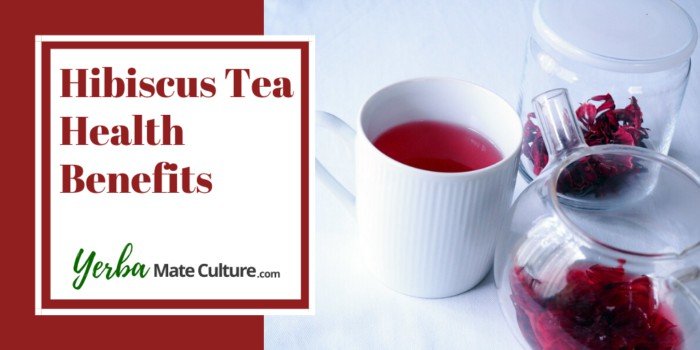

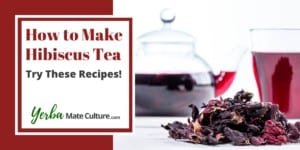
I like to drink tea during the winter months to warm up. I normally drink black tea. Do you think I could get some benefit from drinking black tea one day and Hibiscus tea the next or do you have to drink the hibiscus tea daily to get the best results?
I have three hibiscus plants, do you think purchasing bags at the store is safer than using leaves or blooms from my plants.
John
Thanks for commenting John!
I think it’s fine to drink hibiscus tea only every other day. You would probably get even more benefits out of it if you drink it every day, but don’t force yourself to do that, if you don’t feel like it.
Go ahead and try to make the tea from your own plants. It should be safe as long as the ground where they grow is not contaminated. You can find the instructions for harvesting and making the tea in my article here.
Best Regards,
Joonas
Hi Joonas,
Interesting articles, I specialize in helping people to naturally increase their testosterone production. A major requirement is staying well hydrated. Being British a lot of my clients ask about tea. I steer them away from traditional British tea and am always on the look for alternatives!
Hibiscus sounds like it may have an idea, anything high in antioxidants helps with testosterone production as does anything that reduces insulin spikes.
Quick question, it’s been discovered most tea bags are full of microplastics, can you recommend some loose tea leave brands?
Hi Nate,
Great to hear to you find my articles interesting. You are right that there are microplastics in many tea bags. I will soon post an article about the best hibiscus tea products. It will include both loose-leaf hibiscus and tea bags.
-Joonas
Hello there! Great article! I notice you said hibiscus tea is good for high blood pressure. Is it bad for people with low blood pressure? My dad’s is really low. Thanks for posting. 🙂
Hi Cathy!
Thanks for commenting and a good question. In theory, it could lower blood pressure so that it would become too low. So just to be sure, I would avoid consuming any supplements with hibiscus and avoid drinking large amounts of hibiscus tea frequently. However, one cup of hibiscus tea every now and then would not pose any real risk in my opinion.
Regards,
Joonas
Hey this is agreat article! I drink tea a lot, most tea from rose petals and green tea. Can this tea help with anxiety?
Hi Jessie,
The flavonoids in hibiscus tea may help calm down the nervous system. This can help with reducing anxiety and depression by relaxing your mind and body. There is not a lot of research done related to this, but you can try if it works for you.
-Joonas
Great article. Thank you for sharing your knowledge
How many cups a day are recommended. Is there a better time of day to enjoy hibiscus tea?
Hi Chez,
Great to hear that you liked my article.
2 to 3 cups of hibiscus tea per day is good for getting the health benefits. You can drink it throughout the day, for example, with breakfast, after lunch, and after dinner.
-Joonas